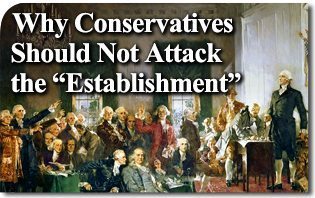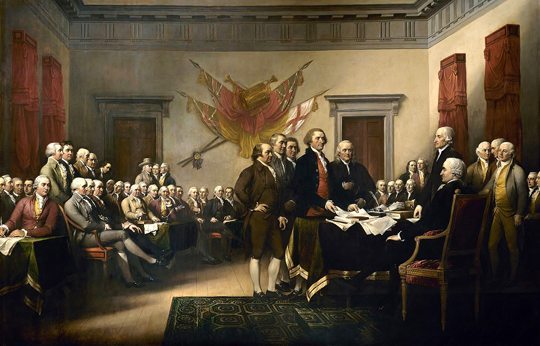 In the 2016 presidential election cycle, no single group, not even President Obama, has been the object of more contempt than “the establishment.” Nearly every candidate of both parties has attacked his or her rivals for supposedly belonging to the “establishment” while vehemently denying ever having belonged to it themselves. Large numbers on the left, and increasingly the right, believe that the “establishment”—whatever that is—is sabotaging the country, and that the next President must fight to destroy its power and influence.
In the 2016 presidential election cycle, no single group, not even President Obama, has been the object of more contempt than “the establishment.” Nearly every candidate of both parties has attacked his or her rivals for supposedly belonging to the “establishment” while vehemently denying ever having belonged to it themselves. Large numbers on the left, and increasingly the right, believe that the “establishment”—whatever that is—is sabotaging the country, and that the next President must fight to destroy its power and influence.
Perhaps the word’s nebulousness makes it so susceptible to attack. When asked to explain what they mean by “establishment,” politicians typically respond with sound bites or campaign slogans about Wall Street, the “big banks,” “big government,” or “career politicians.”
A mere ten years ago, such populist attacks against the “establishment” would have quickly sank the prospects of a presidential candidate in the eyes of public opinion. Now, the most popular candidates are not those with the most money, largest super PAC, or the most endorsements, but the ones who give the shrillest tirades against this faceless nemesis.
The honesty of these attacks is questionable. Nearly all of the self-described enemies of the “establishment” are, even by their own hazy definition, members of it themselves. These self-proclaimed “outsiders” have spent their lives rubbing shoulders with the nation’s elite, boast an impressive rolodex of influential people, attended Ivy League or top-tier universities, and possess wealth far above the average American.
An emotional frenzy directed against an ill-defined enemy like the “establishment” is a dangerous thing. The use and abuse of certain words, especially when mixed with strong emotions, can draw people into adopting ideological positions they ordinarily would not. In the case of the word “establishment,” many conservatives, without their perceiving it, have been influenced to adopt ideological positions that, if not substantially leftist, have the flavor of the sixties.
This tactic of using carefully-chosen, emotionally-charged words is described in detail by Plinio Corrêa de Oliveira in his 1965 book, Unperceived Ideological Transshipment and Dialogue. The left uses what he calls “talismanic words” as a tool of psychological warfare. Media personalities, writers, intellectuals, and other leftist sympathizers use the word in ever more exaggerated, deformed ways until it assumes a radically leftist meaning. The users of the word ascribe to it an almost magical power to solve all problems, hence the term “talisman.” The general public—ignorant of this leftist maneuver—slowly but surely uses the talismanic word in the newly-coined radically leftist sense. In a word, they are “transshipped” into a leftism without perceiving it.
Diversity, a “Talismanic” Word of the Homosexual Movement
The word “Dialogue,” for example, no longer means “a conversation between two or more people.” Rather, it usually implies the idea that any conflict between two opposing sides, no matter how justified or necessary, is always bad. “Tolerance,” another talismanic word, does not mean “to accept feelings, habits, or beliefs that are different from your own,” but rather full-fledged support for abortion and homosexual “marriage” (and the persecution for those who disagree). “Wall Street” has become the “talismanic word” of the left, reducing all the world’s problems to its existence.
The left continuously manufactures these words. Recent examples include “diversity,” “undocumented,” “empowerment,” “safe space,” “racism,” “ecumenism,” “love,” “refugee,” and “the one percent.”
In like manner, “establishment” has assumed a populist, ideological meaning far beyond its original definition of “a group of social, economic, and political leaders who form a ruling class.” It carries with it a charge of resentment, even hatred, for those people in leadership positions. It holds all of America’s elites in contempt for the faults of a few.
The word unjustly loops together pseudo-elites—jet setters, media personalities, sports stars, Hollywood actors, self-serving politicians, and super businessmen—with true, authentic elites. Pseudo-elites, it is true, corrode traditional American culture and work to replace it with a global, artificial one. They set a bad example, hold a selfish worldview, and have a soft disdain for the “flyover” American heartland, alienating those social classes they should be leading. In short, they embrace the benefits of a true elite while shirking its responsibilities, inviting upon themselves the not-entirely-unjustified contempt of the rest of the country.
On the contrary, true elites are those real flesh and blood men and women found in every social class and who lead society, set the tone, and sacrifice for the common good. In spite of our moral decay, good elites can still be found interwoven in the fabric of America, leading businesses, teaching our youth, volunteering in service organizations, joining the clergy, and serving in the military.
It is within these true elites that one finds what author John Horvat calls “representative characters.” He writes:
A representative character is a person who perceives the ideals, principles, and qualities that are desired and admired by a community or nation, and translates them into concrete programs of life and culture. We might point to famous figures like General George Patton or those lesser known people such as self-sacrificing clergy, devoted teachers, or selfless community leaders who draw and fuse society together and set the tone for their communities. Modern culture discourages the idea of representative characters and proposes false and unrepresentative characters that correspond to our mass society.
America has been blessed with an abundance of these “Washingtonian” men and women, who have guided the country during her darkest days and her finest triumphs. A cursory glimpse through American history will quickly reveal a wealth of heroes—social, political, religious, and military. And it is these elites, painted with the label of “establishment,” that the left tries so hard to deride and destroy, not for their faults, but for the good they represent.

Indeed, the term “anti-establishment” was coined by the counter-cultural left of the sixties to summarize everything they hated about America’s political, social, and economic order. Leftist author Howard Zinn, in his book, A People’s History of the United States, defined the establishment as “Republicans, Democrats, newspapers [and] television…the huge military establishment…and that uneasy club of business executives, generals, and politicos.” For Zinn, the problem with America was not the existence of a corrupt leader or dishonest politician, but the very structures of society themselves.
Beginning in the middle of the twentieth century, the American conservative movement arose largely as a reaction to this socialist onslaught. Although they were often the target of derision of the pseudo-elites, conservative intellectuals such as Russel Kirk and William F. Buckley, Jr., elites themselves, stood up to defend American institutions, social order, laws, and traditional institutions as indispensable to a free people.
Resentment for these structures, with their hierarchy and tradition, is a natural consequence of the egalitarianism of socialist ideology. Any institution that represented order, stability, harmony, and tradition was the enemy. Rather than attack these institutions directly, the sixties radicals made no distinction between the pseudo-elites and those true, authentic, “representative characters,” combining them into one single club, “the establishment.” In their quest to impose a socialist cultural revolution on America, they used the abuses of the former—real or imagined—as a weapon to tarnish the latter.
Moreover, this spirit of hatred toward a nation’s leadership bears faint echoes of the French Revolution. In spite of its faults, the Ancien Regime, the “establishment” of the time, was a profoundly Christian social order born of the virtue, vitality, energy, and Christian spirit of the Middle Ages. The revolutionaries of 1789 acted not to correct the problems of this “establishment,” but to violently overthrow it, leaving hundreds of thousands dead in their wake.
The American left, as the spiritual descendants of the French Revolutionaries, would like nothing better than to transform America into a giant Occupy Wall Street slum. Conservative Americans rightfully reject this nightmarish vision of the country. These Americans desire to restore the greatness, strength, and moral fiber that made America great. They would do well, however, not to inadvertently aid the left in overthrowing the very order they seek to restore.

